The CoRRECT™ Three Point Agenda
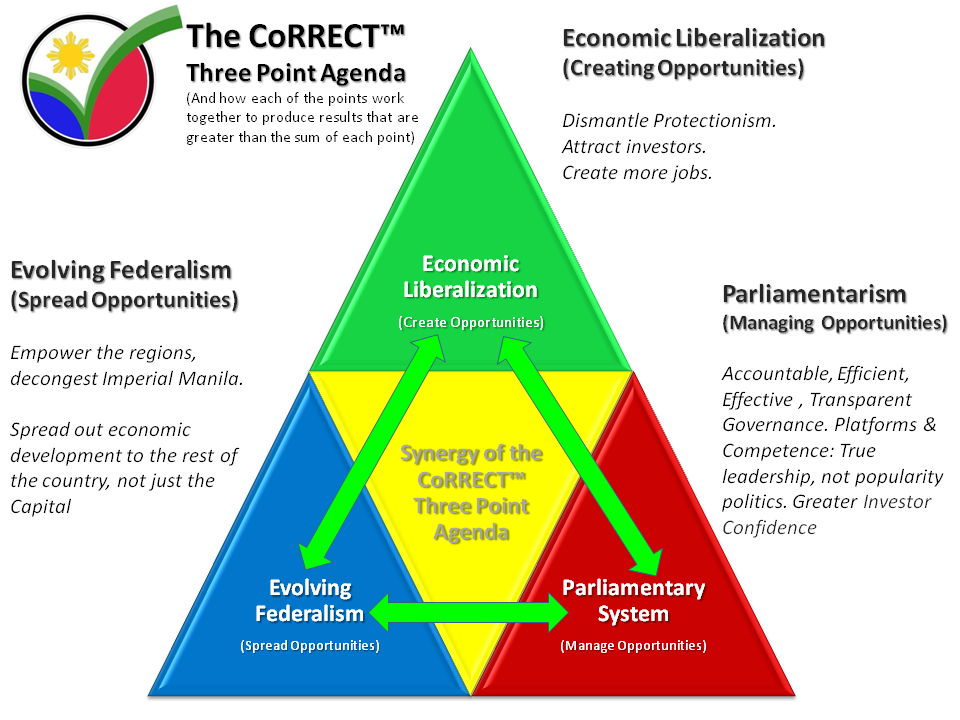
The CoRRECT™ Three Point Agenda was conceptualized as a comprehensive but simple solution that acts as a first enabling step that helps facilitate a lot of other important reforms.
Here are the three points as follows:
“Attract investors. Create more jobs.”
Removing protectionist provisions so as to more easily attract foreign investors to come to the Philippines and help create jobs to solve the massive unemployment problem of the Philippines.
“Empower the regions, decongest Manila.”
Also called “Evolving Region-based Decentralization”, this reform proposal calls for empowering the regions by gradually giving them the appropriate autonomy that would give them the onus to set their own economic and political policies, allowing them to attract investments and make their own regions economically self-sufficient.
“True leadership, not popularity politics.”
By shifting to the Parliamentary System, the problems of gridlock and the excesses of pork barrel politics associated with the Presidential System go away, leaving a more efficient, leaner, more agile and flexible, more stable, more transparent, more accountable, and more professional form of government that more likely produces quality leaders, as opposed to the old excesses of the presidential system which is more prone to celebrity popularity politics.
These Three Points were originally totally separate reform proposals which, on each of their own merits, actually do help immensely to improve the Philippines. However, all three of them, when integrated and joined together, actually work synergistically to produce overall results that far exceed the sum of the results of each reform proposal.
 1.Economic Liberalization helps both Evolving Federalism and Parliamentarism:
1.Economic Liberalization helps both Evolving Federalism and Parliamentarism:
a) Economic Liberalization helps Evolving Federalism by creating economic opportunities that the Regions will benefit from when they decentralize/federalize.
b) Economic Liberalization strengthens Parliamentarism by creating new emerging members of the rich elites, new members of the middle classes, from among the ordinary citizenry who can now provide alternative choices to the old oligarchy/warlord class during elections.
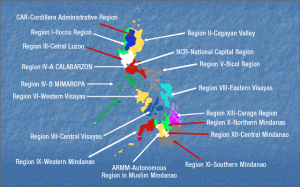 2. Evolving Federalism helps Economic Liberalization and Parliamentarism:
2. Evolving Federalism helps Economic Liberalization and Parliamentarism:
a) Evolving Federalism helps Economic Liberalization by allowing each of the component autonomous regions or “newly federalized states” to compete against each other, such that each region offers attractive enticements such as lower taxes or tax holidays and other incentives to companies (both local businesses and foreign multinationals) to set up in their respective regions.
b) Evolving Federalism helps Parliamentarism by focusing members of parliament who belong to constituencies to be aware of the common regional concerns as well as local concerns of their constituents and thus more vocally raise these issues in parliament, thus giving valuable feedback and input to the collective decision making that goes into policy-and-decision-making.
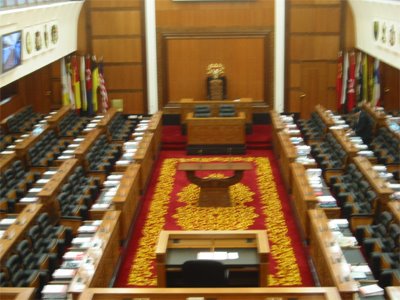 3. Parliamentarism helps Economic Liberalization and Evolving Federalism:
3. Parliamentarism helps Economic Liberalization and Evolving Federalism:
a) Parliamentarism obviously helps Economic Liberalization because parliamentarism creates better quality leaders (of much higher levels of competence and experience) than presidentialism, and thus, the quality of economic decision-making is better and there is more political will in ensuring that the other economic liberalization reforms that need to be done do indeed get done. Empirical evidence proves that Parliamentarism consistently produces more Economically Free economic systems than presidentialism, as shown in the Heritage Foundation’s EFI rankings where the top slots are dominated by Parliamentary Systems. The Parliamentary System’s “Shadow Cabinet” system of checks-and-balances also ensures greater transparency and less corruption, thus improving investor confidence.
b) Parliamentarism helps Evolving Federalism because once you decentralize according to regions in order to eventually form Federalized States, each of the states will pattern their regional governments according to the parliamentary form of government, thus granting the same advantages of better accountability, greater efficiency, greater stability, greater flexibility, and faster implementation of policies to the regional governments, similar to how countries like India, Malaysia, Canada, Australia, Canada, Germany, etc are parliamentary at the national level but are also parliamentary at their component states (or “provincial”) levels.
* * *
* * *
One clear example of how the Three Point Agenda – when all three reform proposals are put together – works to produce superior results than having each reform point work on its own is when looking at the issue of “political dynasties” and warlordism.
Most Filipinos unfortunately do not realize that the issue of political dynasties and warlordism is not a purely political issue, but it is primarily an economic issue that requires both economic and political system reform. Simply coming up with palliative solutions such as laws that seek to ban political dynasties won’t really work.
Instead, the real solution depends on a combination of empowering the people economically by creating economic solutions that dismantle monopolies and allow the more active participation of the wider public so that more people (coming from more families, not just the few clans who currently monopolize the economy and thus dominate politics) can prosper and improve their standard of living. Moreover, the real solution also relies on adopting a political system that more easily allows competent people, regardless of their wealth or popularity, to more easily participate in public office.
Few Filipinos seem to acknowledge the fact that local “Warlords” and local political dynasties exist and continue to have a monopoly of political power because they also happen to wield a monopolistic hold on the local economies of their respective bailiwicks. Most people seem unaware that the basis of political monopoly usually lies within economic monopoly. More often than not, if you monopolize the economy, you monopolize politics.
Many Filipinos are all obviously concerned that “even in a new proposed Parliamentary System, the Warlords will continue to lord it over the people”, but that’s why the answer to that is the Three Point Agenda.
Parliamentarism alone will not solve the political problems of our country.
We need both Economic Liberalization and Region-based Decentralization to go hand-in-hand with a shift to the Parliamentary System.
Because with Economic Liberalization comes numerous new opportunities for wealth creation among the people in the regions and provinces. New companies – including multinational companies or even locally-operated and locally-led but foreign-majority funded, assisted, and bankrolled enterprises will create jobs and improve the lives of millions of ordinary Filipinos.
And with Region-based Decentralization, these companies will not have to be overcrowding themselves in Imperial Manila, but will instead take advantage of attractive offers that various regional governments will dangle to entice them to be based where the land is cheap, the labor is cheaper than in Manila, and yet the quality is still good or even better than Manila’s.
(After all, where do many of the “talented workforce” in Manila often come from? Indeed, they’re mostly from outside of Manila – from the “provinces.”)
So with these two agenda points working together, we will end up with a rising middle class and a newly-emerging nouveau riche class who will be plentiful and actively challenge the existing Warlord-Oligarchy in the different locales.
With Region-based Decentralization, the existing leaders of each region will be forced to compete with the other leaders of other regions in order to attract much-needed investors to set up shop. It will become a matter of pride for the regional leaders to show that they can develop their own regions better than rival regions, by showing that they can produce more jobs, and improve the local economies of their regions. Regional competition in the sphere of economics is always good.
And with the mentioned rising nouveau riche whose wealth will be a result of the economic liberalization reform agenda, more people can stand for election in the new parliament. Who says only those members of the old Oligarchy and Warlord class can join the game, when there will now be a new class of nouveau riche and/or rising middle class intellectuals who can more easily compete against the old order?
With more and better choices to choose from, since candidates from Warlord families or political dynasties will no longer be the only ones rich enough to mount political campaigns, the quality of local and national politics will improve drastically as massive economic development means that an expanded base of rich and middle class people will translate into more numerous active participants in politics, leading to a drastic improvement in the quality of local and national politicians.
Is it really true that Constitutional Reform won’t improve the “people” we elect? Well, if all we did was to shift to a parliamentary system without regionally decentralizing (and moving towards Federalism) and without enabling economic liberalization, then perhaps, the improvement in the quality of our politicians will not be as huge.
That is why it is absolutely imperative that we do not come up with standalone bit-solutions and instead, we must adopt a comprehensive solution that hits all our problems from Three Main Sides. That is why we need to fully implement the full and complete CoRRECT™ Three Point Agenda because eventually, not only will Constitutional Reform simply improve the system, it will also obviously improve the people involved and produce better leaders.

If we do not go with the CoRRECT™ Three Point Agenda, we will unfortunately continue on with the same rotten status quo that keeps our people living in squalor. The Three Point Agenda serves as a First Enabling Step that will make many other important reforms easier to accomplish. The sooner, the better.

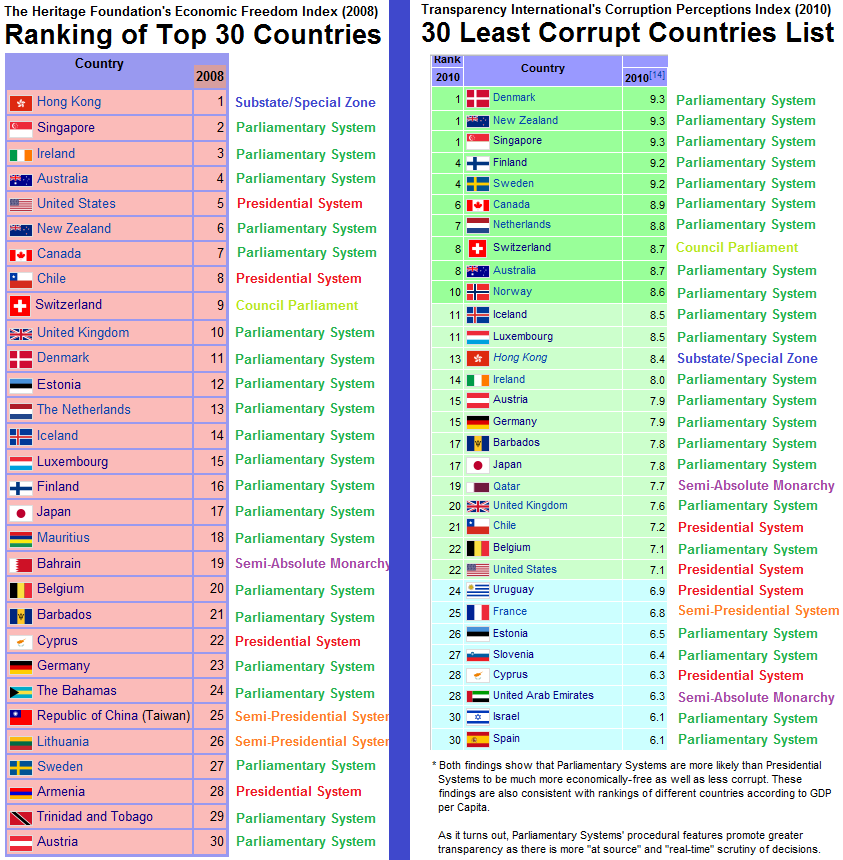



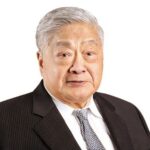



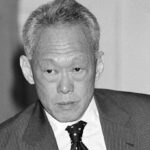



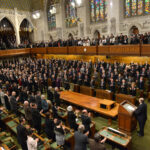
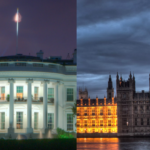

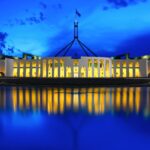







1 Response
[…] I support Bangsamoro as much i support the CoRRecT Three Point Agenda. Share this:TwitterFacebookLike this:LikeBe the first to like this. […]